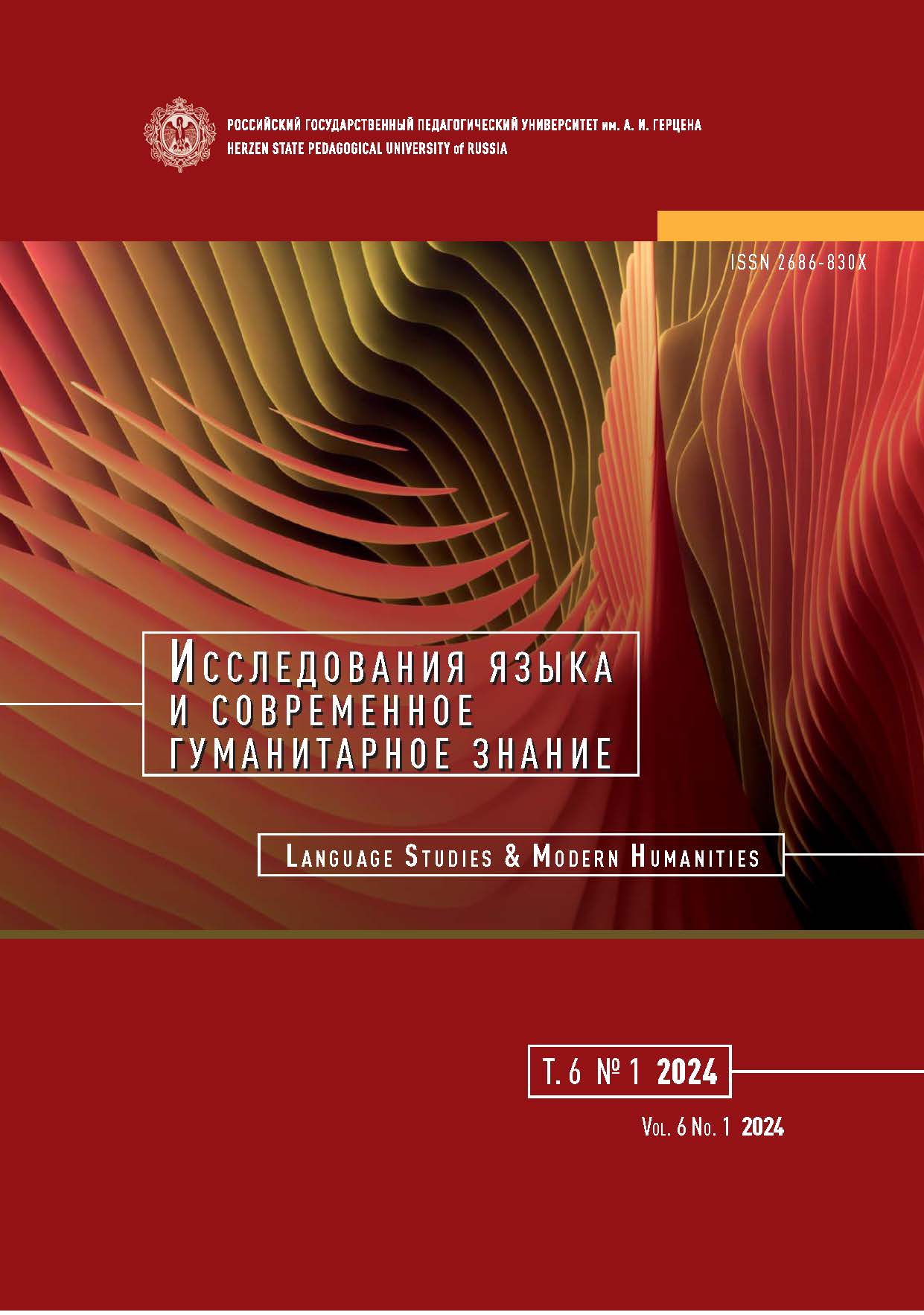Medieval and folk Russian culturonyms in contemporary American novels authored by bilingual heritage writers
DOI:
https://doi.org/10.33910/2686-830X-2024-6-1-30-35Ключевые слова:
bilingual writer, heritage language speaker of Russian, linguaculture, interlinguaculturology, internal translation, transcultural literature, mythopoetic literature, epic fantasy, historical fantasyАннотация
This article examines Russian culturonyms in contemporary American literature. American authors come from a variety of linguistic and cultural backgrounds, and their literary works often reflect translingual and/or transcultural features. The relevance of this article is owed to the expanding study of bilingual creativity among bilingual and bicultural individuals. Bilingual authors, who are also heritage language speakers, often possess linguacultural hybridity because they were raised with several languages and cultures. It is in their fiction writing that this hybridity is often expressed. The aim of this work is to reveal and analyze culture-specific words from Russian medieval linguaculture found in literary works of Nicholas Kotar and Olesya Salnikova-Gilmore, American writers of Russian descent. The bilingual heritage writers often opt for internal translation to describe Russian culturonyms to English-speaking readers. By doing so, bilingual and bicultural writers of Russian heritage introduce and familiarize English speakers with elements of Russian linguaculture. This, in turn, further contributes to the growing English-Russian contact in transcultural literature. In their English-language novels, Kotar and Salnikova-Gilmore skillfully incorporate and adapt Russian culture-specific words and concepts. The findings may provide insight into contemporary literary works written by bilingual heritage writers and their linguacultural hybridity, including the translation strategies implemented in their original interlinguacultural texts.
Библиографические ссылки
SOURCES
Kotar, N. (2017) The Song of the Sirin. Las Vegas: Waystone Press, 420 p. (In English)
Kotar, N. (2018) The Heart of the World. Las Vegas: Waystone Press, 434 p. (In English)
Salnikova-Gilmore, O. (2022) The Witch and the Tsar. New York: Ace Books Publ., 432 p. (In English)
DICTIONARIES
Kabakchi, V. V. (2023) The dictionary of Russia: 2500 cultural terms = Anglo-anglijskij slovar’ russkoj kul’turnoj terminologii [Anglo-English dictionary of Russian cultural terms]. Moscow: Direct-Media Publ., 576 p. (In Russian)
REFERENCES
Antonova, A. M. (2019) Osnovnye printsipy postroeniya teksta inoyazychnogo opisaniya kul’tury [Main principles of the text structure of foreign culture-oriented language]. Sotsial’nye i gumanitarnye nauki na Dal’nem Vostoke — The Humanities and Social Studies in the Far East, vol. 16, no. 1, pp. 121–126. https://doi.org/10.31079/1992-2868-2019-16-1-121-126 (In Russian)
Beloglazova, E. V. (2023) Myth and fact in Russia-centered discourse: The case of (non-)fictional Shostakovich. Language Studies and Modern Humanities, vol. 5, no. 1, pp. 13–19. https://doi.org/10.33910/2686-830X-2023-5-1-13-19 (In English)
Kabakchi, V. V. (2007) Leksikograficheskij monitoring angloyazychnogo slovarya ksenonimov-rusizmov [Lexicographic monitoring of the English lexicon of Russianisms]. In: Problemy filologii i metodiki prepodavaniya inostrannykh yazykov. Vyp. 7 [Issues of philology and foreign languages teaching methodology. Iss. 7]. Pskov: Pskov State Pedagogical University Publ., pp. 30–45. (In Russian)
Kabakchi, V. V., Beloglazova, E. V. (2022) Vvedenie v interlingvokul’turologiyu [Introduction to interlinguoculturology]. 2nd ed. Moscow: Urait Publ., 250 p. (In Russian)
Kellman, S. G. (2000) The translingual imagination. Lincoln: University of Nebraska Press, pp. 134. https://doi.org/10.3366/tal.2002.11.1.139 (In English)
Kiktenko, E. (2023) Zhavoronki. Istoriya i retsept [Larks. History and recipe]. Foma. [Online]. Available at: https://foma.ru/zhavoronki.html (accessed 02.02.2024). (In Russian)
Kotar, N. (2016) Five interesting facts about Russian ritual lamentation. Nicholas Kotar. [Online]. Available at: https://nicholaskotar.com/2016/09/02/russian-ritual-lamentation/ (accessed 02.02.2024).
Kotar, N. (2019) How to survive a Russian fairy tale: Or… how to avoid getting eaten, chopped into little pieces, or turned into a goat. Las Vegas: Waystone Press, 80 p. (In English)
Kotar, N. (2022) The Son of the Deathless. Las Vegas: Waystone Press, 116 p. (In English)
Kotar, N. (2024) About me. Nicholas Kotar. [Online]. Available at: https://nicholaskotar.com/about-me/ (accessed 02.02.2024). (In English)
Pennycook, A. (2007) Global Englishes and transcultural flows. London; New York: Routledge Publ., 189 p. (In English)
Proshina, Z. G. (2017a) Kontaktnaya variantologiya anglijskogo yazyka. Problemy teorii [World Englishes paradigm. Matters of theory]. Moscow: Flinta Publ.; Nauka Publ., 208 p. (In Russian)
Proshina, Z. G. (2017b) Translingvizm i ego prikladnoe znachenie [Translingualism and its application]. Vestnik RUDN. Seriya: Voprosy obrazovaniya: yazyki i spetsial’nost’ — RUDN Journal of Language Education and Translingual Practices, vol. 14, no. 2, pp. 155–170. https://www.doi.org/10.22363/2312-8011-2017-14-2-155-170 (In Russian)
Pym, A. (2009) Cultural translation. [Online]. YouTube. Available at: https://www.youtube.com/watch?v=WV0P8-mhWXM (accessed 15.12.2023). (In English)
Salnikova-Gilmore, O. (2024) About. Olesya Salnikova-Gilmore. [Online]. Available at: https://olesyagilmore.com/about/ (accessed 02.02.2024). (In English)
Sviridova, L., Kravchenko, M. (2001) Russkij fol’klor [Russian folklore]. Vladivostok: Far East State University Press, 368 p. (In Russian)
Загрузки
Опубликован
Выпуск
Раздел
Лицензия
Copyright (c) 2024 София Мария Чемоданова

Это произведение доступно по лицензии Creative Commons «Attribution-NonCommercial» («Атрибуция — Некоммерческое использование») 4.0 Всемирная.
Авторы предоставляют материалы на условиях публичной оферты и лицензии CC BY 4.0. Эта лицензия позволяет неограниченному кругу лиц копировать и распространять материал на любом носителе и в любом формате в любых целях, делать ремиксы, видоизменять, и создавать новое, опираясь на этот материал в любых целях, включая коммерческие.
Данная лицензия сохраняет за автором права на статью, но разрешает другим свободно распространять, использовать и адаптировать работу при обязательном условии указания авторства. Пользователи должны предоставить корректную ссылку на оригинальную публикацию в нашем журнале, указать имена авторов и отметить факт внесения изменений (если таковые были).
Авторские права сохраняются за авторами. Лицензия CC BY 4.0 не передает права третьим лицам, а лишь предоставляет пользователям заранее данное разрешение на использование при соблюдении условия атрибуции. Любое использование будет происходить на условиях этой лицензии. Право на номер журнала как составное произведение принадлежит издателю.







